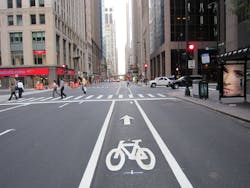ROADS/BRIDGES: Report says bad roads, bridges could cut U.S. GDP by $4 trillion
The American Society of Civil Engineers has concluded that over the next decade, it will cost more than $3.3 trillion to keep up with repairs and replacements to U.S. roads, bridges, airports, power grid and other critical infrastructure, but based on current funding levels, the nation will come up more than $1.4 trillion short.
When projected to 2040, the shortfall is expected to top $5 trillion, unless new funds are allocated.
Without such investment, the ASCE stated in its recent report, Americans can look forward to more highway traffic jams, airport bottlenecks and potential power outages. The deterioration of U.S. ports, roads, trains, water and electric facilities will also take an economic toll, cutting payroll growth by some 2.5 million jobs and some $4 trillion of gross domestic product in lost sales and higher costs.
“America is currently spending more failing to act on its infrastructure gap than it would to close it,” said Greg DiLoreto, the society's past president and chairman of the Committee for America's Infrastructure.
Crumbling infrastructure, said the report, “has a cascading impact on our nation's economy, impacting business productivity, gross domestic product, employment, personal income, and international competitiveness.
Since the ASCE’s last report in 2013, some areas have shown improvement, helped by recent federal, state and local investments.
The federal government undertook a surge of spending to help pull the economy out of the Great Recession with an $800 billion stimulus package of shovel-ready projects that had been deferred for lack of funding. But the pace of investment slowed sharply after the American Recovery and Reinvestment Act of 2009 expired two years later.
Some states have stepped up to fill in the funding gaps. Last year, eight states—Georgia, Idaho, Iowa, Michigan, Nebraska, South Dakota, Utah and Washington—passed legislation to increase gas taxes, and Kentucky and North Carolina moved to limit declines in gas taxes from lower pump prices. Several other states are considering boosting gasoline taxes.
